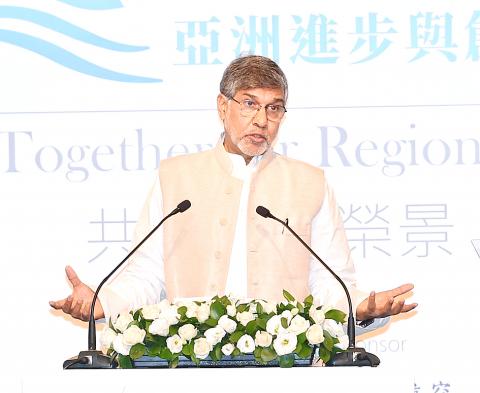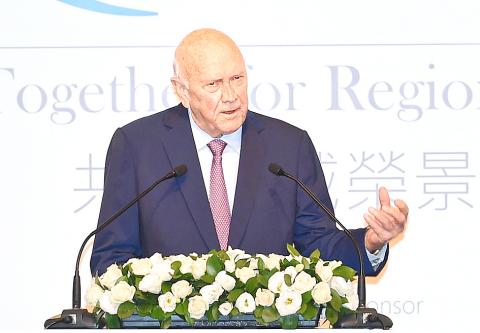Nobel Peace Prize laureate Kailash Satyarthi yesterday applauded Taiwan-led initiatives to engage and empower younger generations to make positive changes.
In a keynote address to the Yushan Forum in Taipei, the Indian laureate said respecting the voices of young people is an important way to find solutions to the many problems afflicting humanity.
“Today I would urge you to prioritize developing our children and young people in the world. No sustainable change, no sustainable peace, no sustainable prosperity is possible without respecting young people in the world,” he said.

Photo: Fang Pin-chao, Taipei Times
Satyarthi, the founder of the Bachpan Bachao Andolan (Save Childhood Movement), which campaigns for the rights of children, shared the 2014 Nobel Peace Prize with then-Pakistani teenager Malala Yousafzai.
Taiwan is like his “second home,” because he has hundreds of “children” who live here, he said, referring both to his second visit to the Taipei and to the Taiwanese volunteers who have worked over the past 10 years at Bal Ashram, his group’s rehabilitation and training center, which caters to the special needs of child labor victims.
Taiwan sends the largest number of volunteers for human services and support in Africa, Asia and other countries around the world in terms of the percentage of population, he said.

Photo: Fang Pin-chao, Taipei Times
“Though Taiwan is a small country, people have a big heart,” he said.
He hailed President Tsai Ing-wen (蔡英文) for her New Southbound policy, adding: “When everybody looks at the North and the West, you have that leadership that looks southbound. Thanks for that.”
The Yushan Forum was inaugurated in October last year as a platform to promote cooperation among nations targeted by the New Southbound policy. This year’s two-day meeting is focused on engagement among young leaders in the region.
Another Nobel peace laureate, former South African president F.W. de Klerk, discussed the role of leaders in guiding change and innovation.
Instead of listening to what the people want and then giving it to them, “the real challenge for real leadership is to convince people what is best for them,” even if achieving that goal might take some sacrifices, he told the forum.
In the long run, the vision would benefit them and, more importantly, the next generation, he said.
After identifying the need, the next challenge for a leader is to formulate a concise goal before convincing his or her voters to back it up, he said.
Taking his country as an example, he said South Africa and its people “were caught up in the downward spiral of violence and continuing repression” in the 1980s.”
“We were in the wrong place. We had to admit to ourselves that where we stood is morally indefensible and therefore we have to change fundamentally,” he said.
US Environmental Protection Agency Principal Deputy Assistant administrator Jane Nishida told the forum that Taiwan’s contributions to environmental protection is a source of inspiration for countries in the region.
Taiwan has made great progress in tackling environmental issues over the past 20 years, including water and air pollution and electronic waste management, Nishida said.
Countries around Asia have been drawn to Taiwan’s example, which is being shared under the International Environmental Partnership, a longtime collaboration between her agency and the Environmental Protection Administration, she said.
“Taiwan has now become a leader in environmental protection and a true global example,” she said.

‘DENIAL DEFENSE’: The US would increase its military presence with uncrewed ships, and submarines, while boosting defense in the Indo-Pacific, a Pete Hegseth memo said The US is reorienting its military strategy to focus primarily on deterring a potential Chinese invasion of Taiwan, a memo signed by US Secretary of Defense Pete Hegseth showed. The memo also called on Taiwan to increase its defense spending. The document, known as the “Interim National Defense Strategic Guidance,” was distributed this month and detailed the national defense plans of US President Donald Trump’s administration, an article in the Washington Post said on Saturday. It outlines how the US can prepare for a potential war with China and defend itself from threats in the “near abroad,” including Greenland and the Panama

A wild live dugong was found in Taiwan for the first time in 88 years, after it was accidentally caught by a fisher’s net on Tuesday in Yilan County’s Fenniaolin (粉鳥林). This is the first sighting of the species in Taiwan since 1937, having already been considered “extinct” in the country and considered as “vulnerable” by the International Union for Conservation of Nature. A fisher surnamed Chen (陳) went to Fenniaolin to collect the fish in his netting, but instead caught a 3m long, 500kg dugong. The fisher released the animal back into the wild, not realizing it was an endangered species at

The Chinese Nationalist Party (KMT) is maintaining close ties with Beijing, the Democratic Progressive Party (DPP) said yesterday, hours after a new round of Chinese military drills in the Taiwan Strait began. Political parties in a democracy have a responsibility to be loyal to the nation and defend its sovereignty, DPP spokesman Justin Wu (吳崢) told a news conference in Taipei. His comments came hours after Beijing announced via Chinese state media that the Chinese People’s Liberation Army’s Eastern Theater Command was holding large-scale drills simulating a multi-pronged attack on Taiwan. Contrary to the KMT’s claims that it is staunchly anti-communist, KMT Deputy

The High Prosecutors’ Office yesterday withdrew an appeal against the acquittal of a former bank manager 22 years after his death, marking Taiwan’s first instance of prosecutors rendering posthumous justice to a wrongfully convicted defendant. Chu Ching-en (諸慶恩) — formerly a manager at the Taipei branch of BNP Paribas — was in 1999 accused by Weng Mao-chung (翁茂鍾), then-president of Chia Her Industrial Co, of forging a request for a fixed deposit of US$10 million by I-Hwa Industrial Co, a subsidiary of Chia Her, which was used as collateral. Chu was ruled not guilty in the first trial, but was found guilty